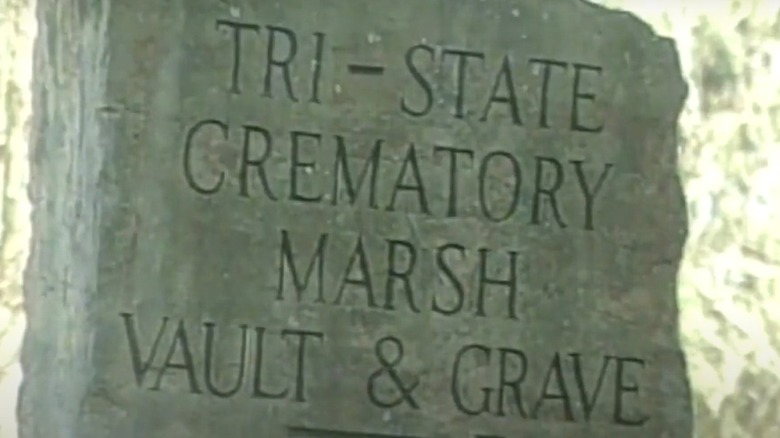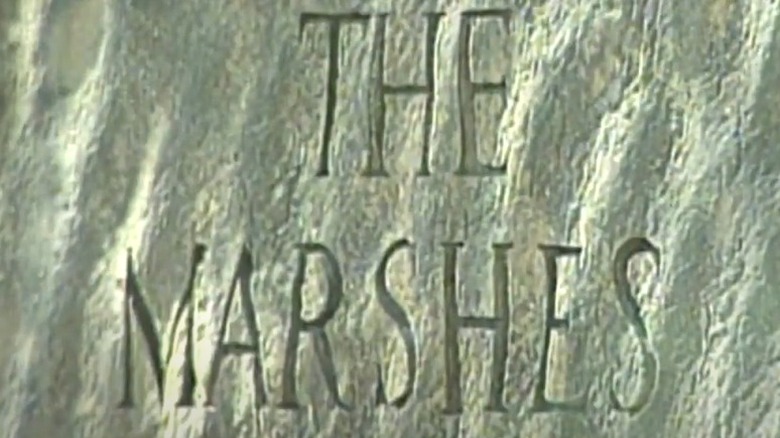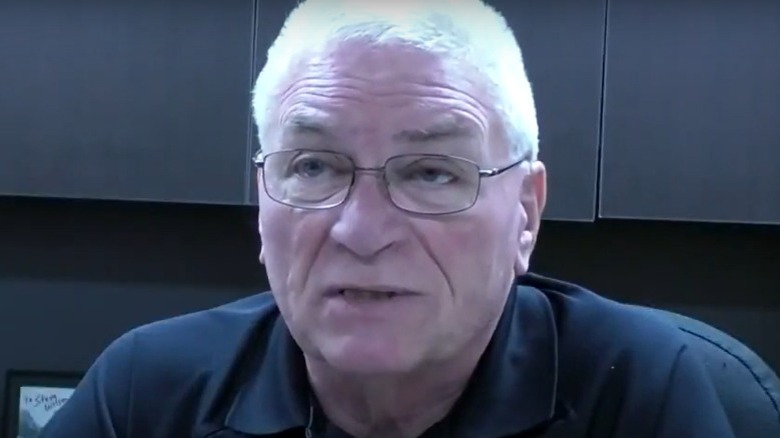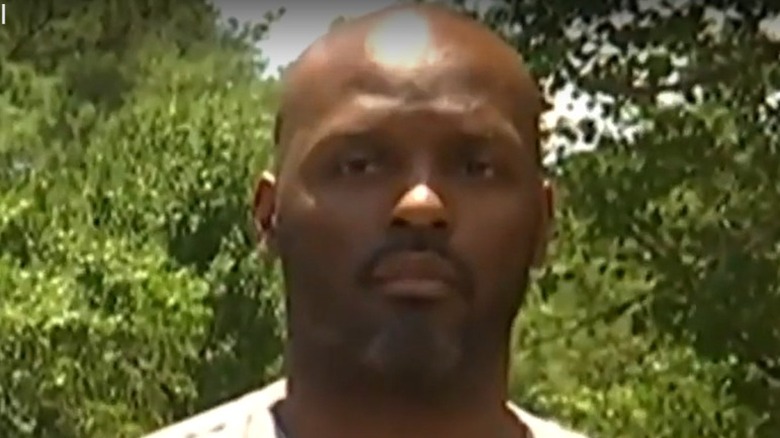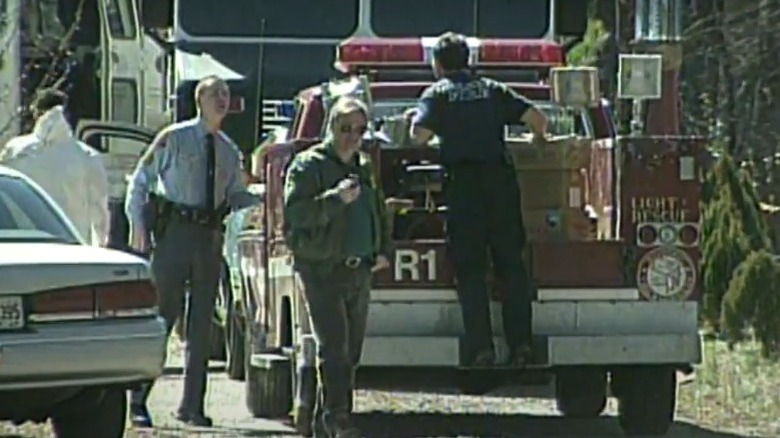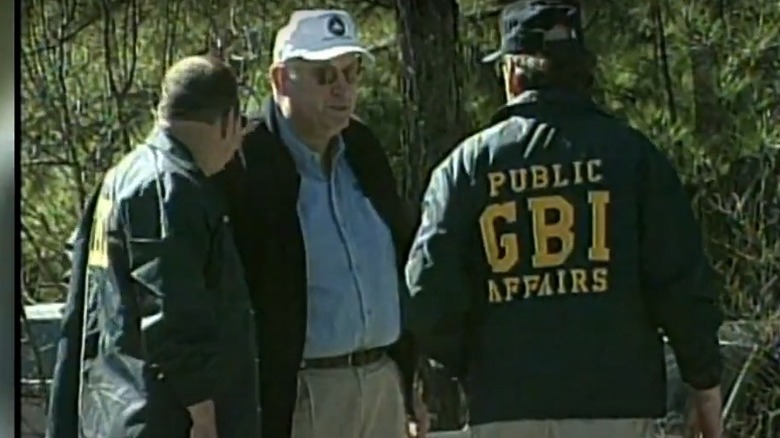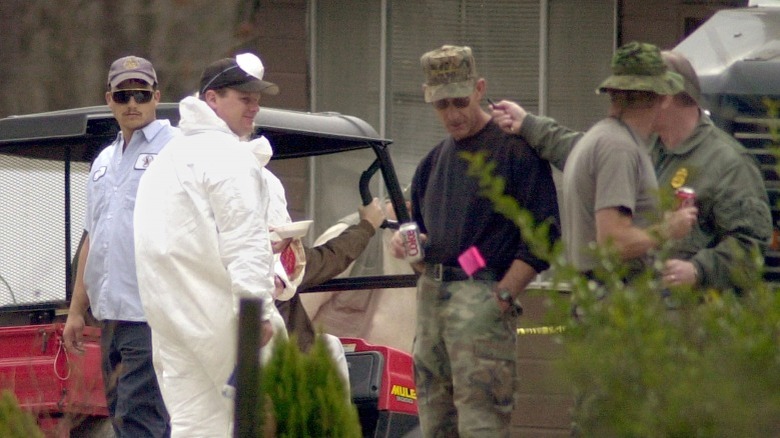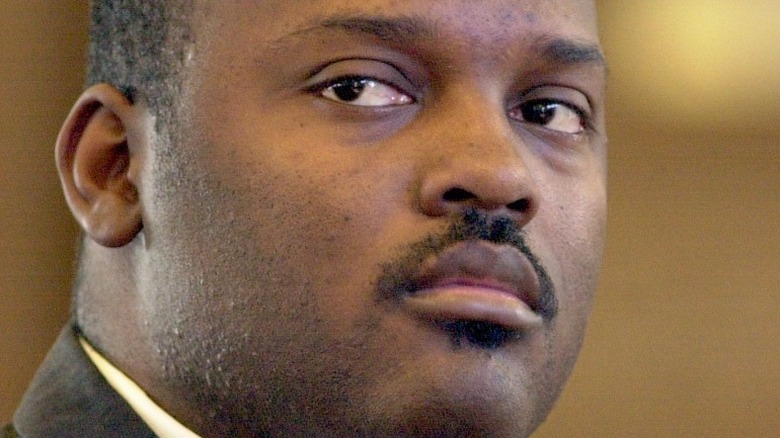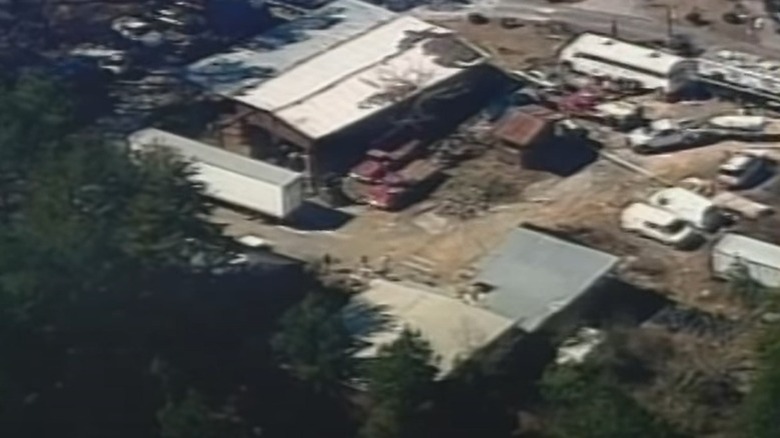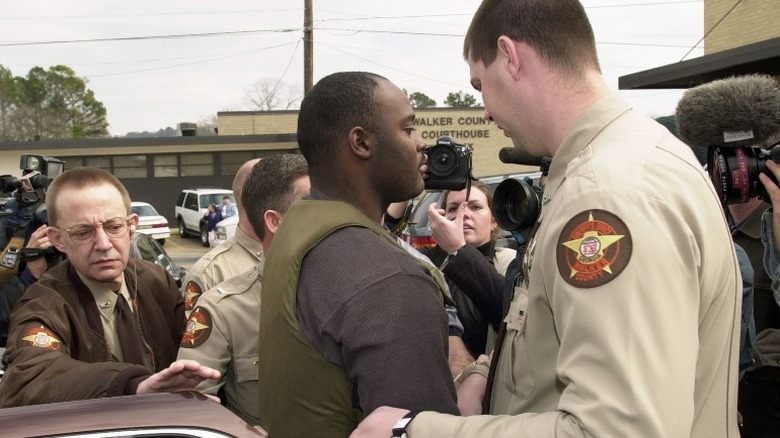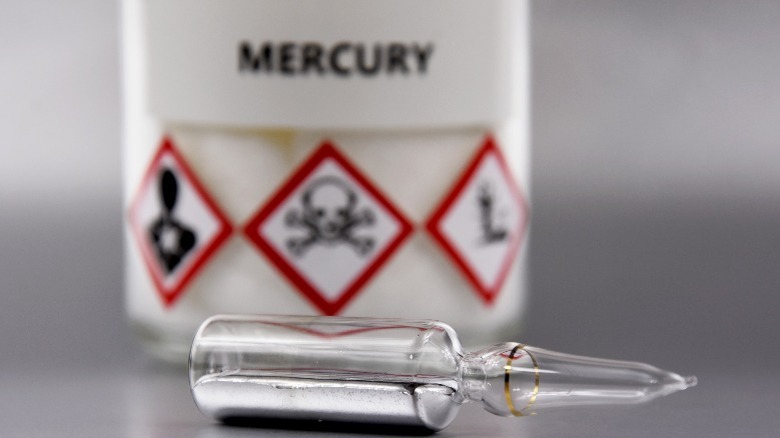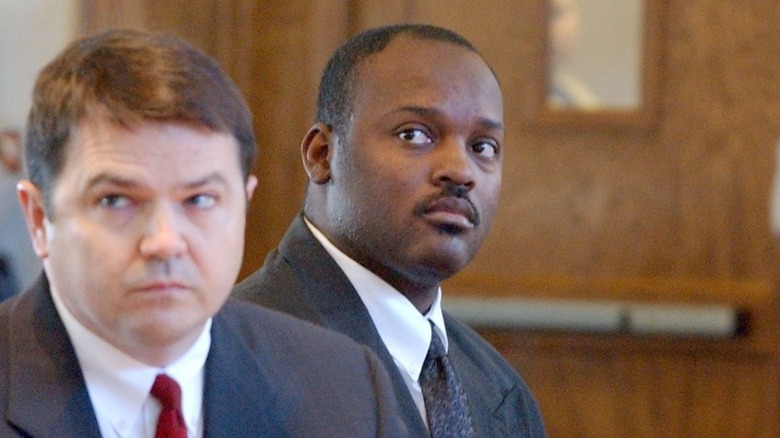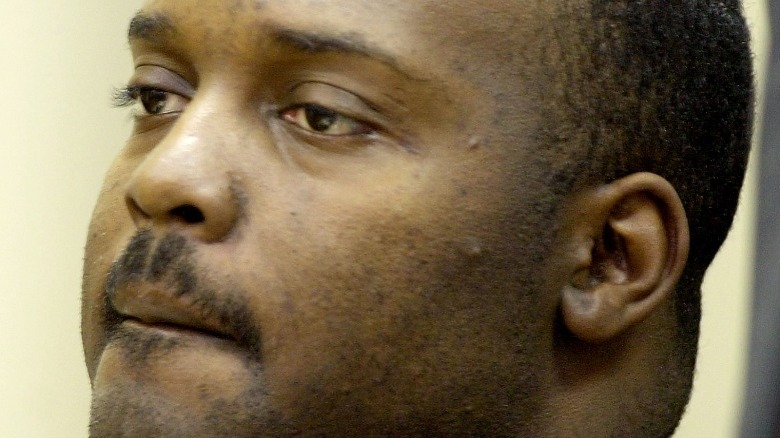The Chilling Tri-State Crematory Scandal Explained
In February 2002, the national spotlight was shone brightly on the small community of Noble in northern Georgia. Sixteen months earlier, the local sheriff's department had been asked to investigate possible human remains on the property of the Tri-State Crematory when a resident filed a complaint. Months after the sheriff basically ignored the report, special agents from the Environmental Protection Agency made a surprise visit. Their findings prompted Sheriff Steve Wilson to bring in multiple outside agencies, including the Georgia Bureau of Investigation (per The Chattanoogan). Within a day, the property was flooded with hundreds of workers and members of the media. What did law enforcement find on their visit to a crematorium that would result in such a frenzy?
The Tri-State Crematory scandal is a twisted tale of a business owner who, instead of cremating bodies in the incinerator, was hoarding corpses on his property. Word quickly got out that the Tri-State site was a house of horrors, with bodies crammed into storage units, partially buried on the grounds, and left to rot inside coffins. Human remains in various stages of decomposition were what greeted investigators at Tri-State, who seemed to find dead bodies behind every closed door and in every storage building.
The grisly scenario at the Tri-State Crematory didn't happen overnight. This was a horror that was years in the making, and it might have continued had it not been for the persistence of one propane delivery technician and his aunt.
Ray Tommy Marsh opened Tri-State in the 1970s
The Tri-State Crematory was opened in the 1970s by Ray Marsh. The Times Free Press reports that Marsh was a well-respected man in the community and built the business literally in his backyard. It was the only crematorium in the area, and soon the northern Georgia-based Tri-State Crematory was getting business from funeral homes as far away as Cleveland, Tennessee.
In the mid-1990s, the operation was turned over to Marsh's son, Brent. The younger Marsh was in his third year of college at the University of Tennessee Chattanooga (UTC) when his father's health issues became too severe for him to continue to run the business. The Chattanoogan reports that Ray Marsh had suffered several strokes, was dealing with complications from diabetes, and had been diagnosed with dementia. With limited options available, they turned over the Tri-State Crematory to their son, perhaps in hopes that he would be able to keep the family venture going.
Brent Marsh had been a premier athlete in high school, where he was a starter for the varsity football team while also lettering in track (per The Chattanoogan). He earned his way onto the UTC football team and had a bright future ahead of him. But within a few years of leaving UTC to run Tri-State Crematory, Marsh would find his entire world turned upside down.
The incident was initially reported in 2000, but ignored
According to The Tifton Gazette, Gerald Cook, a propane delivery driver for Blossman Oil Company, was on a delivery call at the Tri-State Crematory in October 2000. On a path near one of the outbuildings, he witnessed a gruesome scene that he immediately relayed to his supervisor: Skeletal remains lay just a few feet from the path, and what appeared to be human skulls and other bones were in a pile of debris nearby. A complaint was filed with Sheriff Steve Wilson, who dismissed it as being a "regulatory issue," and not in his purview to investigate. Wilson went on the record, according to the Herald-Tribune, stating, "If somebody tells me they saw bodies at the crematory, that's what a crematory is, a place for bodies." (The Herald-Tribune dates the initial complaint to April 2001, but other sources confirm The Tifton Gazette's timeline.)
The Tifton Gazette reported that Cook did not deliver to Tri-State again until October 2001. Though dreading the service call, Cook assured himself that the local authorities would have taken care of his initial complaint. But when he arrived and began to fill the tanks with propane, he was once again met with a horrific sight.
Cook noticed a backhoe 20 feet from where he was standing. Next to the backhoe, out in the open, was a body in a severe state of decomposition. He then noticed a blue tarp that was covering a mound that he assumed held additional bodies. He finished his job quickly and left.
The EPA took the complaint, but it reached a dead end
Cook's aunt, Faye Deal, was an information management assistant with the Federal Bureau of Investigation office in Rossville, Georgia (via The Tifton Gazette). Cook reported his concerns to her at this time, and she decided to contact the EPA. She spoke with investigator Frank Garcia and began to unwind her nephew's observations. Deal seemed to think Garcia wasn't buying the story she was telling him, prompting her to take a different approach. Deal asked Garcia what he would do if she were walking her dog on the property and found a human bone. Garcia then promised to make an inquiry into the matter. This inquiry turned out to be a phone call to Major Hill Morrison of the Walker County Sheriff's Department. Morrisson sent officer Mark Stanfield out to the Marsh residence. He was greeted by Brent Marsh's mother, Clara, and told her there was a complaint about a bone being found on the crematory property. She and her husband told the officer there was no way this was possible.
Stanfield left the Marsh house, looked toward the crematorium, and saw that the gate to it was locked. After looking around, he saw nothing out of the ordinary and left, reporting to his superiors that he hadn't seen anything amiss.
Faye Deal's persistence led to the discoveries
Months passed. On Valentine's Day 2002, Deal pressed the matter again, this time contacting a criminal investigator with the EPA. She left a message on agent Robin Hedden's answering machine, going into gory detail about her nephew's findings on the Tri-State property (per The Tifton Gazette). When Hedden listened to the message, he decided to investigate the matter immediately. On February 15, 2002, Hedden left his Atlanta office for Noble with another EPA investigator, Larry Anderson. As their agency can enter properties under their jurisdiction without a warrant, they did not notify any law enforcement agencies of their upcoming visit to the crematorium.
When they arrived and opened the door to the first building on the property, the two were shocked at what they saw. Bodies were piled around the room in various states of decomposition, fluids still oozing from some of them. Several bodies were dressed in hospital gowns and still had their hospital ID bracelets secured around their wrists (per the Times Free Press).
Beyond every door, they were greeted with scenes that were more and more horrifying. The Walker County Sheriff's Department soon arrived on the scene to assist.
'It was like something out of a Stephen King novel'
As more authorities arrived at Tri-State, more horrors were revealed. The Times Free Press reports that the decomposing body of a man in a suit was discovered in a wooden box, the skeleton of a baby at his feet. Outside on the grounds of the crematorium, a dilapidated hearse held the badly decomposed body of a man inside a casket. Some bodies appeared to have been dragged across the floors of various buildings on the property and left to rot.
Walker County Sheriff's Detective Walter Hensley stated that "it was like something out of a Stephen King novel," and verified that whenever any building was opened, more and more bodies were discovered.
On February 19, 2002, Dr. Kris Sperry, Georgia's chief medical examiner, told the media that 149 bodies had been discovered at that point. He talked of the discovery of about half a dozen coffins, each containing human remains. These coffins appeared to have been buried in the ground at one point and then unearthed (per The Chattanoogan).
Officials informed the public that a mobile morgue unit had been brought to the scene to help with the remains that were constantly being discovered. A team of nearly two dozen experts consisting of trained pathologists, doctors, nurses, and other professionals was dispatched with the mobile morgue unit. The same team had been on site to help identify victims at the World Trade Center in 2001.
Families were given potting soil instead of their loved ones' cremains
Inside a storage building were a set of vaults that were opened. After entering them, investigators discovered that they contained human remains in various states of decomposition. The largest of the vaults contained roughly 40 bodies, while the five smaller ones had been crammed with 20 or so apiece (per The Chattanoogan).
Imagine seeing this story unfold, knowing that the funeral home you and your family used for the cremation of a loved one had contracted with the Tri-State Crematory. Though it was obvious that Marsh had not been cremating the bodies that his business was given, there were certainly people who had been given their relatives' cremains while Tri-State was in business. Investigators reached out to as many of them as they could find. They also conducted an extensive examination of the contents of the urns that Tri-State had used to store the ashes of the many deceased people whose bodies had been brought to them. Nearly 80 families came forward, bringing their loved ones' cremains in to be looked over. Seven contained substances that were not of human origin. One of them appeared to consist partially of dirt or potting soil.
This situation lends some credence to statements given to the media by several nearby residents. In a bone-chilling revelation, they stated that they had not seen smoke coming from the crematorium's smokestack in years (via The Chattanoogan).
Tri-State sent up a variety of red flags prior to 2002
The legal issues surrounding the Tri-State Crematory extended beyond the scandal that erupted across the nation's news networks in 2002. In 1995, it was alleged that the crematorium was not operating as a legal business. This prompted former Walker County coroner Bill McGill to file a complaint against Tri-State with the state examining board for funeral homes. The Chattanoogan reports that, though the complaint was dismissed before its scheduled hearing date in mid-1996, the 27-year veteran of the coroner's office was insistent that Tri-State was in the wrong. "I filed it because it wasn't licensed and it wasn't legal. They were not following the law," he alleged.
The Times Free Press reports that the elder Marsh didn't have a license to operate, as it had lapsed without renewal. But officials had such lax regulations in Georgia at the time that it was overlooked. After all, people in the community trusted Marsh, as they would later trust his son, Brent. The media outlet also revealed that Brent Marsh was not a licensed funeral director. When questioned, the state of Georgia admitted that, at the time, these licenses weren't closely monitored.
From 1996 until the scandal broke in early 2002, at least two separate complaints were made against Brent Marsh and the Tri-State Crematory, alleging improper handling of human bodies. These complaints were given to the Walker County Sheriff's Department, which failed to act.
Nearly 350 bodies were eventually found
When the investigation concluded, 334 bodies had been discovered on the property (via WSB-TV Atlanta). Sadly, only about two thirds of them were positively identified, leaving many loved ones in the dark as to what might have happened to the remains of their deceased family members.
Marsh was charged with multiple crimes in court. The Times Free Press reports that at first, the state scrambled to figure out what to charge him with. They were dead bodies that were given to Marsh, so there could be no charges of murder or assault. The media outlet goes on to state that, at that time in Georgia, desecration of a corpse wasn't a felony.
Ultimately, prosecutors built a case that was mostly based on Marsh's unacceptable and illegal business practices. They charged him with 787 felonies, including 439 counts of theft, 179 counts of abuse of a corpse, 122 counts of burial service fraud, and 47 counts of making false statements.
Marsh took a plea bargain
Facing hundreds of charges, Marsh was probably aware that he might spend the rest of his life behind bars if he took his case to trial and lost. With his attorneys, he worked out a plea arrangement with the courts. In August 2022, Marsh was sentenced to 12 years in a Georgia prison (per CBS News). News Channel 9 reports that he was also sentenced to 75 years of probation, effectively being under some sort of court supervision for the rest of his days. Additionally, Marsh was ordered to pay $20,000 in fines.
Before his sentencing was given by the judge, the court allowed Marsh's victims to speak. For six hours, more than 20 relatives of the deceased that were left in Marsh's care spoke, in what could only be described as a harrowing and emotional day in the courtroom.
When they had concluded, Marsh was granted permission to address the court and his victims. "I can't give you the answers that you want, but I can apologize," Marsh stated. When he was sentenced, at last, he had these final words before being escorted out of the courtroom to prison: ""I will not cry when I go into my jail cell. I will not whimper. I will accept my punishment. I will do my time."
What was Marsh's motivation?
Arguably, all Marsh needed to do was cremate the bodies that he was given. After all, that was the sole purpose of the crematorium. With the money he was making from funeral homes and individuals, it would seem that he had a lucrative business.
Marsh's attorney offered an unusual theory behind his client's actions. The Chattanoogan reports that attorney McCracken "Ken" Poston revealed that Marsh exhibited several physical symptoms that are sometimes indicative of mercury poisoning. He went on to state that many of Marsh's father's symptoms and illnesses were also very likely to be from prolonged exposure to the same dangerous element. The mercury from tooth fillings would melt while a body was being cremated, and the poorly ventilated crematorium exposed anyone in it to the toxic effects.
Though Brent Marsh didn't cremate all of the bodies he was given, it was shown that he did indeed cremate several hundred of the nearly 1,000 bodies placed in his care. According to WSB-TV Atlanta, Poston also pointed out that the longer his client was away from the crematorium due to his incarceration, the clearer his head got and the more lucid he became.
The Tri-State incident resulted in two large civil lawsuits
The criminal investigation and court proceedings were only part of what the victims endured. A civil lawsuit against the funeral homes that sent bodies to Tri-State Crematory resulted in a settlement of more than $35 million. much of which was paid out to victims.
Additionally, a separate civil suit was brought against Marsh himself. This was settled for $80 million (via CBS News).The Times Free Press reported in 2012 that a combined payout of over $100 million had been made to the nearly 2,000 affected families.
The media outlet also reported that the Tri-State Crematory incident cost the state of Georgia and Walker County more than $10 million. These government agencies were forced to spend taxpayer dollars to investigate, prosecute, and ultimately clean up the mess that Marsh alone created with his grotesque business practices. Walker County was seeking $2 million from Marsh specifically for cleanup (via Northwest Georgia News), but that suit was dismissed in court (per The Chattanoogan).
Walker County took the case to the Georgia State Court of Appeals, where the suit was ultimately dismissed.
Marsh was released from prison in 2016
In June of 2016, Marsh was released from the Central State Prison after serving the entirety of his 12-year sentence (via WSB-TV Atlanta). He was walked out of the facility by his attorney, McCracken Poston, who told the media that his client was going home to Walker County, Georgia (per Northwest Georgia News). Poston discussed some details of Marsh's life behind bars, claiming that his client was a model prisoner who spent his sentence trying to make himself a better person.
Marsh studied and earned theology degrees while incarcerated, perhaps prompting his attorney to appeal to the Christians in Marsh's community. "I am asking for them to practice their Christian theology and forgive him and welcome him back into the community," he stated. He also discussed how Marsh would be spending the rest of his life on probation, and would still have to pay the fines the court levied against him.
WSB-TV Atlanta reports that Marsh is unlikely to publicly discuss his crimes with anyone, as doing so could violate the terms of his plea agreement. Marsh is also forbidden to profit in any way from the horrors he allowed at the Tri-State Crematory.
